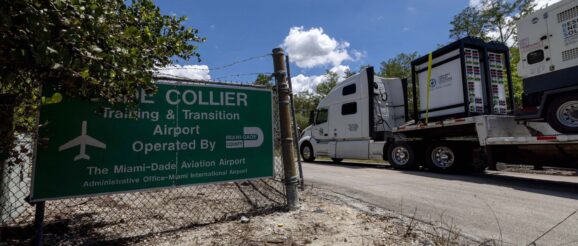Trump to visit ‘Alligator Alcatraz,’ Florida detention site

President Trump is due in Florida on Tuesday to visit what’s been dubbed “Alligator Alcatraz,” a controversial migrant detention center in the Everglades that the state has stood up in a matter of days.
Florida Gov. Ron DeSantis spoke about the president’s trip at an unrelated news conference on Monday.
“When the president comes tomorrow he’s going to be able to see … What’ll happen is you’ll bring people in there, they ain’t going anywhere once they’re there unless you want them to go somewhere, because, good luck getting to civilization,” DeSantis said. “So the security is amazing — natural and otherwise.”

Florida officials announced early last week that they’d gotten federal approval to build a detention facility at the Dade-Collier Training and Transition Airport, an isolated, 39-square mile airstrip located within the wetlands of the Big Cypress National Preserve, next to Everglades National Park.
Its sole, roughly 11,000-foot runway has largely been used for training purposes, but officials say it will soon accommodate deportation flights.

“So you’ll be able to bring people in, they’ll get processed, they have an order of removal, then they can be queued and the federal government can fly — right on the runway, right there, you literally drive them 2,000 feet, put them on a plane and then they’re gone,” said DeSantis.
The site’s nickname — coined by Florida Attorney General James Uthmeier — is a nod to the infamous island prison off the San Francisco coast and to its proximity to the predators of the marshy Everglades, from pythons to alligators to mosquitoes.

AP/Office of Attorney General James Uthmeier
Uthmeier said last week that the facility will mostly consist of tents and trailers, with no brick-and-mortar construction required.
He said it was on track to open with some 5,000 beds — about half of its overall capacity — by early July, which DeSantis confirmed on Monday.
“DHS approved us doing this last week and I think by tomorrow it’ll be ready for business,” the governor said, referring to the Department of Homeland Security.
The agency is overseeing the Trump administration’s crackdown on illegal immigration, including by ramping up deportations and arrests and setting a daily quota of 3,000 arrests.
The administration wants to more than double its existing number of beds for detaining migrants nationwide to 100,000 and has framed Florida’s newest detention facility as a key part of that effort.

“We are working on cost-effective and innovative ways to deliver on the American people’s mandate for mass deportations,” DHS said last week. “Alligator Alcatraz will expand facilities and bed space in just days, thanks to our partnership with Florida.”
The facility will cost Florida some $450 million to run for one year, according to DHS, though much of that will be reimbursed by the Federal Emergency Management Agency (FEMA). While the airstrip is owned by Miami-Dade County, where officials have viewed the plan with skepticism, DeSantis is using his emergency authority to proceed on a tight schedule.
Florida Republicans have embraced the project, with the state GOP now selling “Alligator Alcatraz”-branded T-shirts, trucker hats and beer koozies on its website.
The project has many critics

Giorgio Viera/AFP via Getty Images
Just as the facility’s setup was swift, so too was backlash to it.
In recent days, hundreds of people representing a broad coalition of concerned Floridians — from conservationists to Indigenous communities — have lined the nearby highway to protest the site’s development.

This time around, opponents include immigration advocates who are worried about a lack of oversight at the facility, as well as the welfare of detainees being held in tents in Florida’s notorious summer humidity and what forecasters predict will be another above-average hurricane season.
State officials have said they are drafting natural disaster plans for the facility, with a spokesperson for DeSantis telling the Associated Press that it will be evacuated “if a tropical cyclone with windspeeds higher than the temporary facility’s wind rating is forecasted to impact the area.”
The project is also opposed by Native American groups, who consider the area their sacred ancestral homeland. Its site is immediately adjacent to the Tamiami Trail, which hosts 19 traditional Miccosukee and Seminole villages, Miccosukee Chairman Talbert Cypress said in a statement.

“Rather than Miccosukee homelands being an uninhabited wasteland for alligators and pythons, as some have suggested, the Big Cypress is the Tribe’s traditional homelands,” Cypress said. “The landscape has protected the Miccosukee and Seminole people for generations.”
He said the state would save taxpayer money by moving the facility to a different location “with more existing infrastructure and less environmental and cultural impacts to the Big Cypress and Tribal lands.”
Environmentalists are also concerned about the impact of the facility on the Everglades’ fragile ecosystem. The 1.5 million acres of wetlands are home to a variety of endangered species — including the Florida panther, West Indian manatee and American Crocodile — and a vital water source for the region.

Two environmental groups — Friends of the Everglades and Center for Biological Diversity — tried to block work on the site by suing federal and state officials on Friday, saying they haven’t put the plan through a federally required environmental review or given the public a chance to comment.
“The hasty transformation of the Site into a mass detention facility, which includes the installation of housing units, construction of sanitation and food services systems, industrial high-intensity lighting infrastructure, diesel power generators, substantial fill material altering the natural terrain, and provision of transportation logistics (including apparent planned use of the runway to receive and deport detainees) poses clear environmental impacts,” reads the lawsuit.
DeSantis has downplayed concerns, saying the facility will be temporary and have “zero environmental impacts.” A DHS spokesperson described the lawsuit as “lazy,” while Uthmeier’s office says it anticipated such “frivolous claims and banter from those who oppose enforcing immigration law.”
